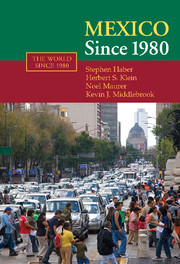Book contents
- Frontmatter
- Contents
- List of Figures
- Acknowledgments
- Abbreviations and Acronyms
- 1 The Second Mexican Revolution: Economic, Political, and Social Change Since 1980
- 2 Mexico Before 1982: The Political Economy of Authoritarian Rule
- 3 The Causes and Consequences of Free Trade
- 4 The Mexican Banking System: The Politics and Economics of Financial Underdevelopment
- 5 The Transformation of Mexican Politics
- 6 Health, Education, and Welfare in Mexico Since 1980
- 7 Democracy and Development in Mexico: Future Challenges and the Legacies of Authoritarian Rule
- Bibliography
- Index
7 - Democracy and Development in Mexico: Future Challenges and the Legacies of Authoritarian Rule
Published online by Cambridge University Press: 05 September 2012
- Frontmatter
- Contents
- List of Figures
- Acknowledgments
- Abbreviations and Acronyms
- 1 The Second Mexican Revolution: Economic, Political, and Social Change Since 1980
- 2 Mexico Before 1982: The Political Economy of Authoritarian Rule
- 3 The Causes and Consequences of Free Trade
- 4 The Mexican Banking System: The Politics and Economics of Financial Underdevelopment
- 5 The Transformation of Mexican Politics
- 6 Health, Education, and Welfare in Mexico Since 1980
- 7 Democracy and Development in Mexico: Future Challenges and the Legacies of Authoritarian Rule
- Bibliography
- Index
Summary
Since the early 1980s Mexico has experienced momentous economic, political, and social change. Of the various transformations examined in the preceding chapters of this book, the consolidation of a competitive electoral democracy was particularly important because it ended well over a century of authoritarian rule and established essential (albeit insufficient) bases for a liberal-democratic order. The combination of free and fair elections, intense multiparty competition for power, and heightened media scrutiny of political developments has significantly increased Mexican citizens' capacity to hold government officials accountable for their public actions. Partisan alternation in power at the national level and assertive actions by federal legislators and judicial authorities in a more effective system of checks and balances have also greatly constrained what was once an all-powerful presidency. Moreover, nongovernmental organizations and other civil society groups with widely divergent goals and partisan loyalties play an important role in what is an increasingly pluralistic public policy-making process.
Nevertheless, Mexico is burdened by multiple legacies of authoritarianism and the rent-seeking coalitions that ruled the country until the end of the twentieth century. For instance, the persistence of public monopolies and private oligopolies in key economic sectors, and the weakness of government regulatory authorities charged with promoting competition and protecting consumer rights, are direct legacies of the concentrated political and economic power that characterized Mexico under the Institutional Revolutionary Party (PRI) and the fact that the privatization of many state-owned firms during the 1980s and early 1990s occurred while that regime still held sway.
- Type
- Chapter
- Information
- Mexico since 1980 , pp. 201 - 220Publisher: Cambridge University PressPrint publication year: 2008

